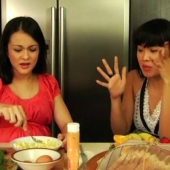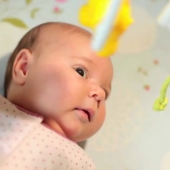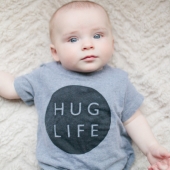It is what we think of as a serve and return kind of relationship. Particularly early in life nurturing relationships are those that are interactive, that involve touch, that involve exchanges of information and speech.
Nurturing relationships in the first year of life are are moms who are willing to touch their babies, to carry their babies, to speak to their babies, even to read to their young infants, to be responsive to the information that the baby is giving back to the mom.
One of the many remarkable things about the human newborn is that they come sort of pre-programmed to do this kind of mirroring of the emotions that they see on an other's face. One example of the kind of responsive, nurturing, relational activity between a parent and a child is this showing an emotion, reading an emotion, and the exchange back and forth.
That can even happen with a pre-verbal child who is not able to use language yet, but who is able to have a whole interaction with a father or a mother based only on this exchange of facial expression.
Well, language, like brains, is built from the bottom up. It begins with a simple vocalization that happens within the first few days of life. And over the the first year of life the ability to understand and use language obviously develops exponentially. It just takes off in that first year of life.
But over that first year of life there's plenty of opportunity for this kind of back-and-forth exchange that we think of as human conversation to happen between a parent and child in a sort of early, very simple way.
Parents can laugh with their babies. They can mimic their babies vocalizations. So if the baby is going bah bah bah, the mom or the dad can say bah bah bah back and begin to develop these kinda back and forth contingent responses that are a part of how the baby learns to use language and how the brain begins to develop in the areas that subserve language.
- 11 views













